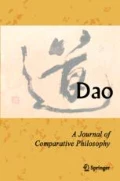Abstract
The idea of contentment or sufficiency is an important theme throughout the Laozi 老子, and Western readings of this text have especially emphasized an understanding of contentment in terms of satisfaction with an existence free of excessive material possessions. Building on recent scholarship that suggests a close connection between the kind of early breath cultivation described in the “Neiye 內業” (“Inward Training”) chapter of the Guanzi 管子 and the form and content of the Laozi, this article explores how the concept of contentment or sufficiency is treated in both texts as an embodied phenomenon, often manifesting as a balance of psycho-physical energies. It argues that reading the Laozi on contentment in this light yields a more complete picture of how this concept functions there, concluding that this reading will be more helpful in thinking about wider ethical issues of materialism and acquisitiveness.
Similar content being viewed by others
References
Guanzi, A Concordance to the 管子逐字索引. 2001. Edited by D. C. Lau. Hong Kong 香港: Shangwu Yinshuguan 商務印書館.
Henricks, Robert G. 1992. Lao-Tzu Te-Tao Ching: A New Translation Based on the Recently Discovered Ma-Wang-Tui Texts. New York: Ballantine Books.
____. 2000. Lao Tzu’s Tao Te Ching: A Translation of the Startling New Documents Found at Guodian. New York: Columbia University Press.
Ivanhoe, Philip J. 2002. The Daodejing of Laozi. Indianapolis: Hackett Publishing.
LaFargue, Michael. 1992. The Tao of the Tao Te Ching: A Translation and Commentary. Albany: SUNY Press.
Laozi, A Concordance to the 老子逐字索引. 1996. Edited by D. C. Lau. Hong Kong 香港: Shangwu Yinshuguan 商務印書館.
Lau, D. C., trans. 2001. Tao Te Ching: A Bilingual Edition. Hong Kong: The Chinese University Press.
MacIntyre, Alasdair C. 1991. “Incommensurability, Truth, and the Conversation between Confucians and Aristotelians about the Virtues.” In Culture and Modernity: East-West Philosophic Perspectives, edited by Eliot Deutsch. Honolulu: University of Hawaii Press.
Mair, Victor H. 1990. Tao Te Ching: The Classic Book of Integrity and the Way. New York: Bantam Books.
Roth, Harold D. 1997. “Evidence for Stages of Meditation in Early Taoism.” Bulletin of the School of Oriental and African Studies, University of London 60.2: 295–314.
____. 1999a. Original Tao: Inward Training (Nei-Yeh) and the Foundations of Taoist Mysticism. New York: Columbia University Press.
____. 1999b. “The Laozi in the Context of Early Daoist Mystical Praxis.” In Religious and Philosophical Aspects of the Laozi, edited by Mark Csikszentmihalyi and Philip J. Ivanhoe. Albany: SUNY Press.
Waley, Arthur, trans. 1994. The Way and Its Power: Lao Tzu’s Tao Te Ching and Its Place in Chinese Thought. New York: Grove Press.
Author information
Authors and Affiliations
Corresponding author
Rights and permissions
About this article
Cite this article
Duperon, M. “Knowing What Is Sufficient” and the Embodied Nature of Contentment in the Laozi and the “Neiye”. Dao 16, 205–219 (2017). https://doi.org/10.1007/s11712-017-9547-9
Published:
Issue Date:
DOI: https://doi.org/10.1007/s11712-017-9547-9




